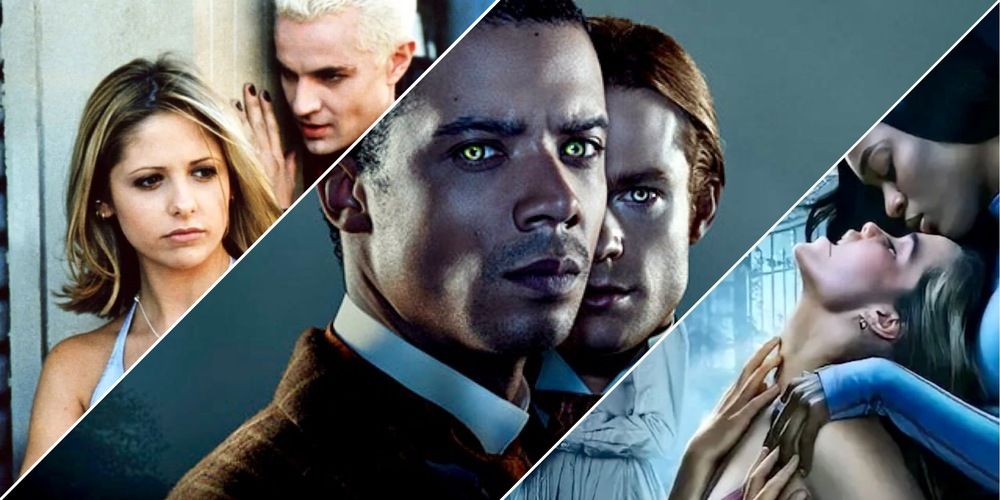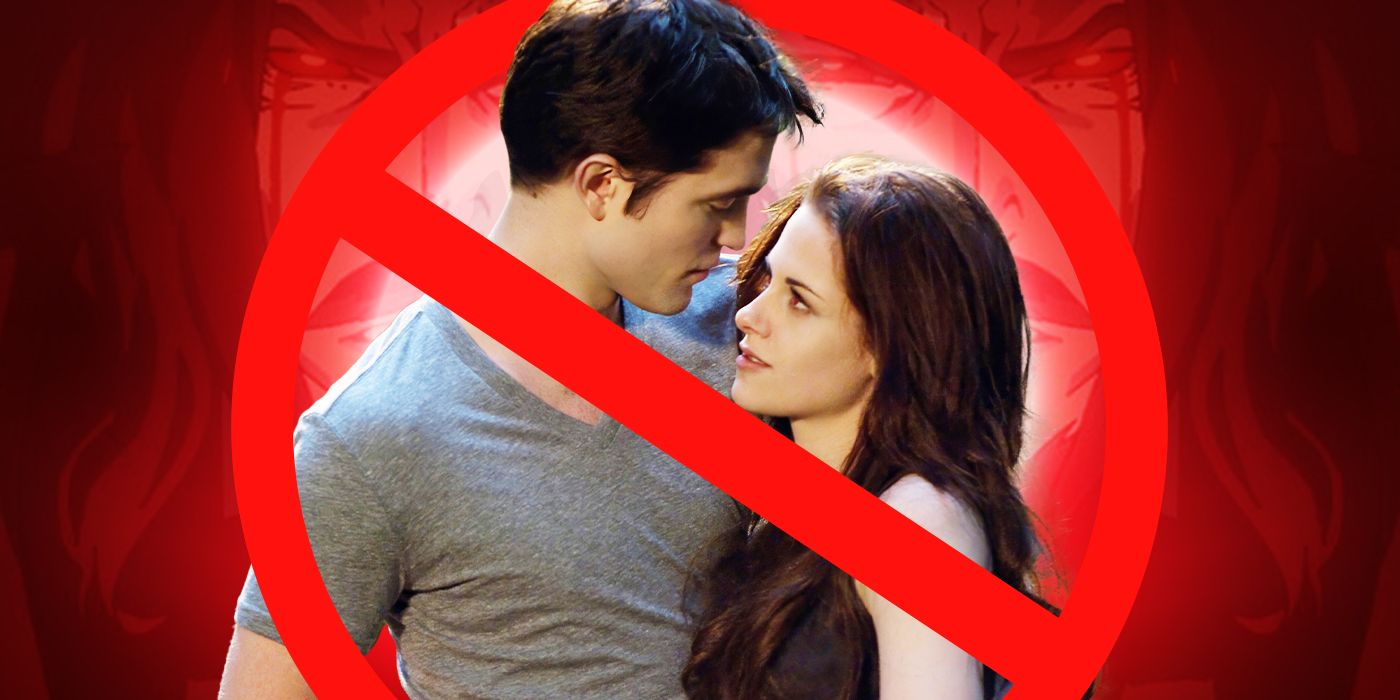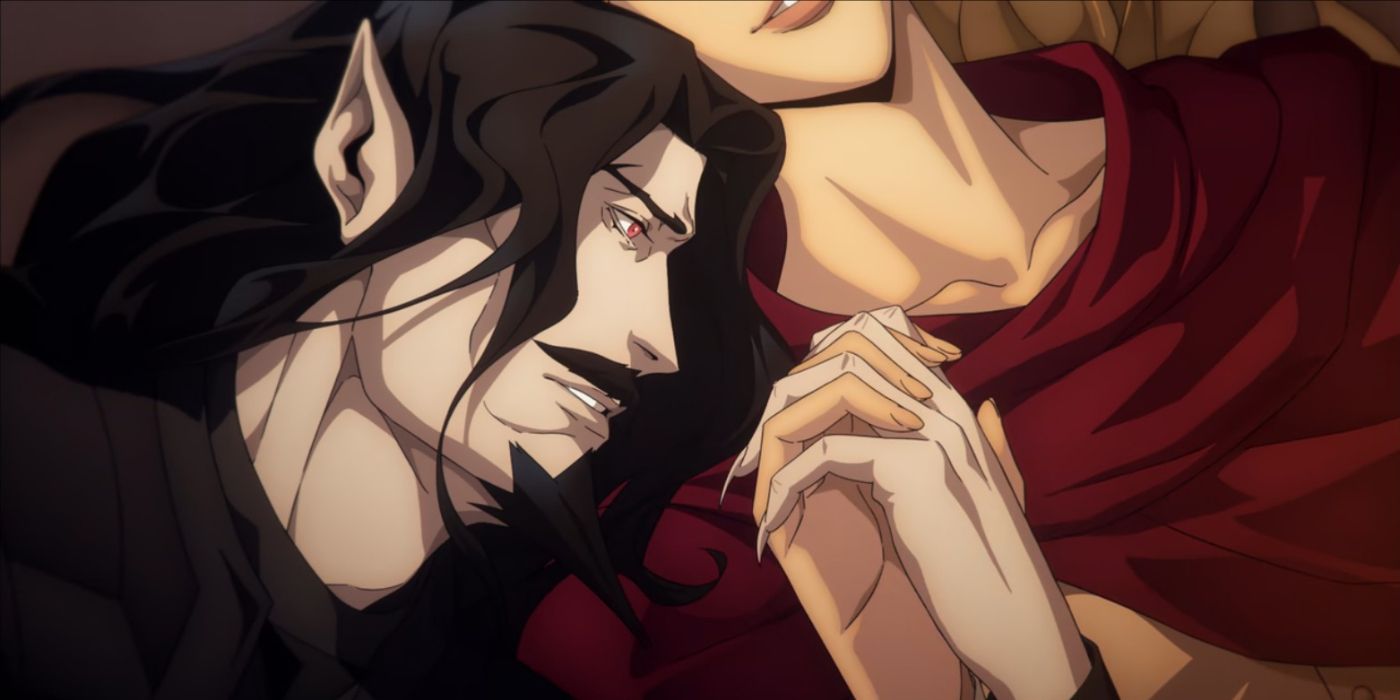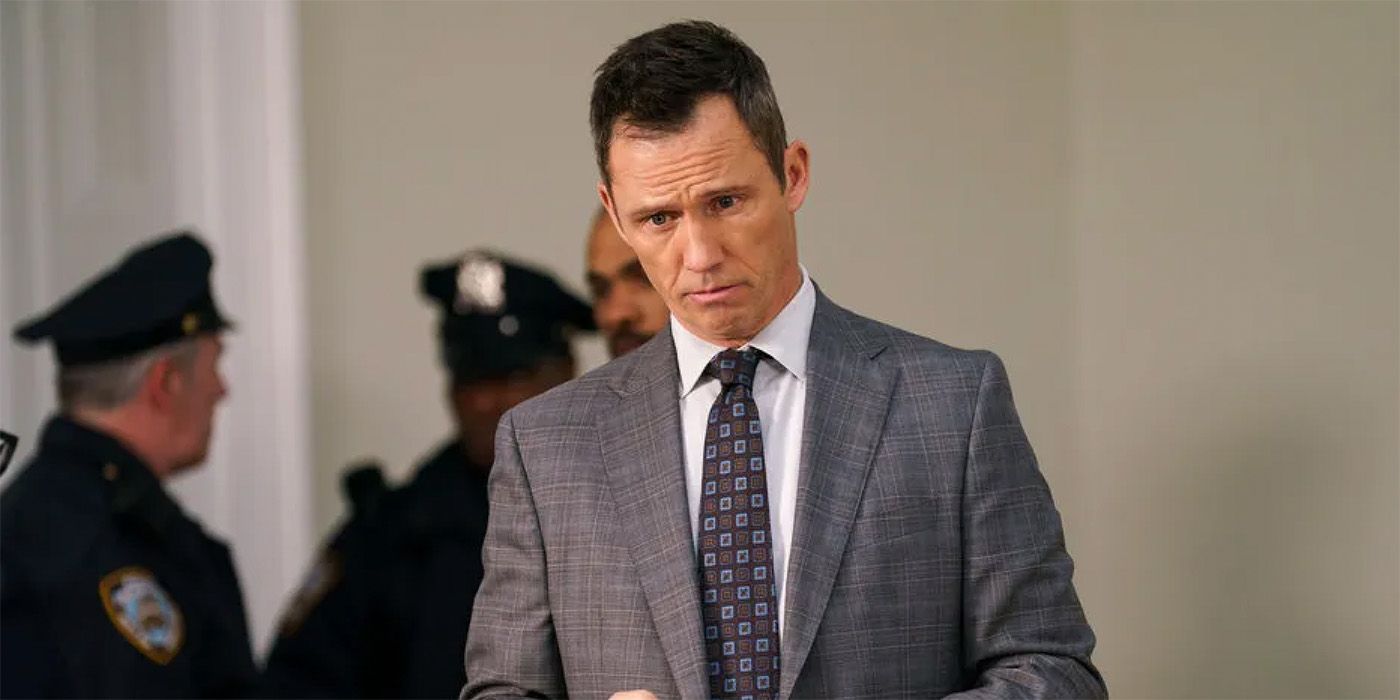The Big Picture
- Vampire romance has always been a popular theme in fiction, and the appeal remains in modern interpretations.
- The best vampire romance isn’t one of the most popular, like Twilight or The Vampire Diaries, but Dracula and Lisa from Netflix’s Castlevania series; their love story is based on mutual respect, intellect, and empowerment.
- The tragic bond between Dracula and Lisa, including their devotion to each other and their son, makes their romance the most relatable and human of all vampire love stories.
Vampire romance has existed almost as long as vampire fiction itself. Someone thirsting (pun absolutely intended) over an attractive bloodsucker is as prevailing a practice as stakes through the heart or avoiding the sunrise. The original Dracula and Carmilla novels posit lusting for sexy vampires as sinful, but that’s the appeal. The pull toward these villains remained undeniable enough for modern interpretations to extricate the 1800s subtext and morph it into blood-soaked, swoonworthy text. Consequently, vampire romance branched off into different subgenres and scored their mainstream heyday during the early 2000s. A plethora of contemporary options remains, too: Interview with the Vampire, A Discovery of Witches, the unfairly canceled First Kill, and even the Baldur’s Gate 3 video game played in the “we know you want to kiss a vampire” sandbox.
Of course, which fang-toothed love story constitutes as the “best” one depends on your preferences. I’m still going to “um, actually” you that the best vampire romance of all time is a fixed in stone, indisputable thing. Forget Bella and Edward, Elena and Damon, or Buffy and Angel and/or Buffy and Spike — the champions are Dracula and Lisa from Netflix’s Castlevania series.
Castlevania
A vampire hunter fights to save a besieged city from an army of otherworldly creatures controlled by Dracula.
- Release Date
- July 7, 2017
- Rating
- TV-MA
- Seasons
- 4
- Studio
- Netflix
How Does Dracula and Lisa’s Romance Begin in ‘Castlevania’?
Castlevania began as a 1980s video game series from the acclaimed Japanese studio Konami. The basic premise pits a family of vampire hunters, the Belmonts, against Dracula, the lord of all evil vampires. The Count wants to annihilate humanity because a group of humans killed his wife, Lisa, believing the mortal woman wasn’t a skilled doctor but a witch. One of the Belmonts (the game’s protagonist) vanquishes Dracula only for him to resurrect a few decades or centuries later and try again (aka: Konami made a new game). A new Belmont destroys Dracula once more, and the cycle continues with each new installment.
Netflix’s four-season adaptation keeps the basic premise but significantly expands Castlevania‘s world and characters. For one, the games keep Lisa offscreen. She’s never more than a tired trope, a dead motivation for her angsty husband’s actions. The Lisa of the television series (Emily Swallow) might see less screen time than other characters, but those brief sketches craft a fully-fledged, grounded, and delightful character with indefatigable agency. From word one, her self-assurance sets the terms for her romance with Dracula. Season 1 opens with Lisa impaling an attacking bat on her knife and then banging that same blood-stained blade on Dracula’s (Graham McTavish) front door. His castle is an imposing nightmare of spiraling medieval architecture as well as a mechanical wonder composed of spinning wheels and sparking electricity. Combined with all the staked corpses that double as lawn decor, not even the Girl Scouts or door-to-door politicians would bother.
But this is Lisa Tepes, who has altruism pumping her heart as much as blood. She’s determined to become a doctor for the sole purpose of bettering others’ lives. Her desire to learn is voracious. Because of this, her regressively superstitious community has branded her as a witch and her options are non-existent. Rumors that Dracula possesses scientific knowledge beyond mortal understanding lure her to his doorstep. Lisa being Lisa, she doesn’t stop knocking at the murderous entity’s door until he lets her in.
Dracula being Dracula, a towering black-clad figure with a pointed beard that screams “evil,” threatens her with death. Lisa has the courage, the self-possession, and the sheer lack of patience to wave off his sinister theatrics. Instead, she implores him to teach her his secrets. She never begs, but she’s earnest. When Dracula asks what he’ll get out of this bargain? “Perhaps I could help you relearn some manners,” Lisa tartly replies. The agency of women protagonists regarding their supernatural boyfriends improved decade by decade, which is a legacy from which Lisa benefits. Netflix is course-correcting Castlevania‘s own history, after all. But even Buffy Summers has the benefit of her once-every-generation superpowers. Lisa has nothing except her will and her tenacity. This is a woman so resolved to help others and achieve her goals that she approaches what might as well be Satan with rational intellect and calm empathy. It’s not a case of selling her soul but forcing the devil to respect her on egalitarian grounds.

10 Fan Favorite Vampire Couples on TV, According to Reddit
Fans are bloodthirsty over these fang-tastic TV couples.
‘Castlevania’ Shows a Surprisingly Healthy Vampire-Human Romance
Suitably charmed, Dracula accepts Lisa’s daring terms. He channels the Beast introducing Belle to her custom library when he shows Lisa his gadget-filled laboratory. It’s advanced science and medicine, not magic, that Dracula’s cultivated throughout the centuries and hoarded away for himself. Lisa beams in awed wonder, a joyful light to the vampire’s darkness. The spark between them, and the symbolism, is obvious. They might strike as an unlikely pair, but they’re kindred spirits bonded by intellect and outcast by society’s oppressive fearmongering. Their contrasts, shown through respectful debates and widening perspectives, elevate an already healthy match into the realm of soulmates. If Dracula’s science made Lisa come alive with wonder, then the lord of the night falls ass backward in love at first sight.
Most of Dracula and Lisa’s romance takes place offscreen. More’s the pity, but the snippets build a potent picture. Their besottingly devoted marriage lasts twenty years, and they dote upon their son Adrian/Alucard (James Callis) with utmost tenderness. They move into a cozy cottage, Lisa’s medical practice thrives, and Dracula opens his mind about humanity by traveling the world. “If you would love me as a man,” she tells him, “then live as a man.” Lisa literally says “I can fix him” and then makes him do all the work. Get this woman a medal.
Castlevania‘s tragedy arrives when the Wallachian church burns Lisa alive on trumped-up witchcraft charges. Her reaction, beyond fear and anguish? She begs the officials to spare her so they avoid Dracula’s retribution (and so he won’t undo all his progress), and then she implores her husband to forgive her murderers’ ignorance. Lisa’s no waif or naive ingénue. Her resilient belief in humankind’s potential doesn’t boil down to rose-colored glasses. She’s witnessed her species at their most corrupt and still chooses to hope, to help, and to believe their goodness is worth protecting, and in a way that never weakens her internal strength. In return, all she receives from the religious patriarchy is an agonizing death.
Dracula as a Vulnerable Widower Is Romance Gold
Lisa’s loss is the visceral, brutal heart that defines the Castlevania series. Netflix’s interpretation of the game’s storyline almost redeems the fridged woman trope because of how reverently Lisa was loved and spread love in return. Her murder’s aftermath isn’t just a widower’s heartbreak because an angry stoic man needs a reason to be angry and stoic. These are multiple black holes littered everywhere she left an imprint. The ramifications threaten the entire world when Dracula vows to commit genocide against humanity, but it’s also insular: the irreparable shattering of individual hearts.
What’s more, it’s undeniable how oddly satisfying Dracula’s rage is to watch unfold. He weeps tears of blood and actually burns the world down in his beloved wife’s name. In other stories, Dracula would be the protagonist and audiences would feel easy glee as he mows down those responsible. Castlevania, instead, is a bleak, complicated knot of morality and empathy even when Dracula’s hoards mercilessly eviscerate the guilty. His wide net decimates the innocent, too, something Lisa would sooner die again than condone. With just a little more awareness and care, a man spurred to vengeful carnage after a woman’s death doesn’t just feel validated, it makes sense narratively. Dracula is the king of monsters. To that monster he reverts when the mortals he’s detested prove his most nightmarish instincts correct.
Yet Castlevania flips even that on its head. Dracula is depressive, scattered, and exhausted. There’s no sign of refinement or a keen tactician. He died alongside Lisa; he’s just taking the world with him in a long, inexorable slide. Castlevania recontextualizes the world’s most famous vampire by making him the most vulnerable he’s ever been. This isn’t a seductive lover or a sadist for sadism’s sake. This is a dearth of soul, an unending prism of loss. When tested, Dracula couldn’t be the better man Lisa willed him to be. But for a time, her love made him human again. Adi Shankar, the series’ showrunner, confirmed that the Dracula as a relatable, subversive antihero angle was intentional: “The trick to making Castlevania resonate was this idea that Dracula isn’t a bad guy, he isn’t a villain, he’s just a person consumed with darkness,” he said in 2018. “He’s not just this mustache-curling, one-dimensional villain.”
Graham McTavish in the role is a minor miracle, too, delivering the best Dracula performance the modern day has yet to see. (This is a hill I will die on.) His delivery, pitched equally liquid-smooth and gravel-growling, speaks to unfathomable history, power, and grief. McTavish’s Dracula is a tragic antihero, not a villain. The fact that his eyes literally cloud over with blood, and he manifests as a 20-foot tall pillar of face-shaped flame is a bonus. If my hypothetical widower doesn’t vow to avenge me by destroying humanity, then I’m not interested.
Tragic Endings? Not in My Vampire Romance!
In a twist on the video game canon where Dracula and the Belmonts fight in an endless cycle, Castlevania ends with Lisa and Dracula getting a surprise, bittersweet second chance. Not only are they resurrected in a botched ritual, they decide to live a quiet, humble life in England. The tenderness between them is profoundly acute: two wounded souls try to reckon with tentative hope, and they hold hands all the while. Perhaps this was a love worth burning down the world for after all. In 2021, Kevin Kolde, one of Castlevania‘s producers, said it “felt right” for this formerly doomed romance to flourish without its normal canonical baggage. There’s no guarantee that Dracula won’t return for Castlevania: Nocturne in some form, especially since Alucard has already done so. But as of Castlevania‘s end, the two are deservedly happy. In Kolde’s words, “The way we approached it with Dracula and Lisa, there certainly was […] a great love there,”
Dracula and Lisa are supreme among vampire romances because there’s never a moment that doesn’t equate to emotional disembowelment. That pain stems from the kind of relatable love that’s of a mind-melting capacity only fiction can sell. And sell it Castlevania does through the performances, notable writing choices, and Powerhouse Animation Studio’s haunting atmosphere. Each element coalesces into a cohesive whole, which is what Dracula and Lisa made: a whole from two halves. And even with a vampire as one half, their story is actually the most human love story of all.
Castlevania is available to stream on Netflix.
Watch on Netflix






